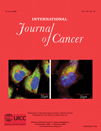Psychiatric disorder as a first manifestation of cancer: A 10-year population-based study
Abstract
To investigate the possibility that psychiatric symptoms could be caused by a yet undetected cancer or be part of a paraneoplastic syndrome, nationwide population-based registers were linked including the Danish Psychiatric Central Register and the Danish Cancer Registry. Data were analysed as a cohort study using survival analysis techniques and incidence rate ratios (IRRs) were used as measures of relative risk. A total of 4,320,623 persons were followed in the 10-year period 1994–2003, resulting in 37,581,600 person-years at risk, 202,144 persons with a first-time psychiatric contact, and 208,995 persons diagnosed with cancer. During the first month after a first-time psychiatric contact, the incidence of all forms of cancer was elevated; IRR: 2.61 (95% CI, 2.31–2.95). Particularly the incidence of brain tumours was elevated; IRR: 18.85 (95% CI, 14.52–24.48), but also the incidence of lung cancer; IRR: 2.98 (95% CI, 2.16–4.12), and especially small-cell lung cancer; IRR: 6.13 (95% CI, 3.39–11.07) was elevated. The elevated IRR for most cancers decreased towards unity within the first 3 months, except for brain tumours, for which the IRR remained significantly elevated during the first 9 months. One of every 63 patients above 50 years of age was diagnosed with malignant cancer within 1 year of first-time psychiatric contact. These results indicate an increased incidence of cancer, especially for brain tumours and small-cell lung cancer, in the first months after a first-time contact to a psychiatric hospital. Clinicians should be aware that first-onset psychiatric symptoms could be a sign of a yet undetected cancer. © 2009 UICC




